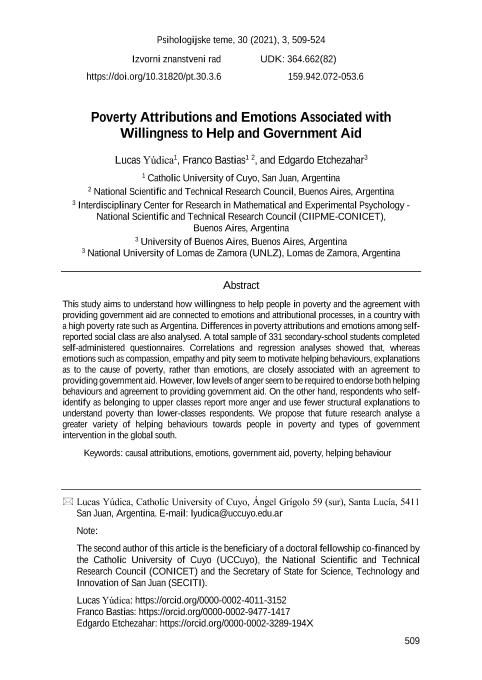Artículo
Poverty Attributions and Emotions Associated With Willingness to Help and Government Aid
Fecha de publicación:
12/2021
Editorial:
University of Rijeka. Faculty of Humanities and Social Sciences
Revista:
Psihologijske teme
ISSN:
1332-0742
e-ISSN:
1849-0395
Idioma:
Inglés
Tipo de recurso:
Artículo publicado
Clasificación temática:
Resumen
This study aims to understand how willingness to help people in poverty and the agreement with providing government aid are connected to emotions and attributional processes, in a country with a high poverty rate such as Argentina. Differences in poverty attributions and emotions among selfreported social class are also analysed. A total sample of 331 secondary-school students completed self-administered questionnaires. Correlations and regression analyses showed that, whereas emotionssuch as compassion, empathy and pity seem to motivate helping behaviours, explanations as to the cause of poverty, rather than emotions, are closely associated with an agreement to providing government aid. However, low levels of angerseem to be required to endorse both helping behaviours and agreement to providing government aid. On the other hand, respondents who selfidentify as belonging to upper classes report more anger and use fewer structural explanations to understand poverty than lower-classes respondents. We propose that future research analyse a greater variety of helping behaviours towards people in poverty and types of government intervention in the global south.
Palabras clave:
Causal attributions
,
Emotions
,
Government aid
,
Poverty
,
Helping behaviour
Archivos asociados
Licencia
Identificadores
Colecciones
Articulos(CIIPME)
Articulos de CENTRO INTER. DE INV. EN PSICOLOGIA MATEMATICA Y EXP. "DR. HORACIO J.A RIMOLDI"
Articulos de CENTRO INTER. DE INV. EN PSICOLOGIA MATEMATICA Y EXP. "DR. HORACIO J.A RIMOLDI"
Citación
Yúdica, Lucas; Bastias, Franco Emmanuel; Etchezahar, Edgardo Daniel; Poverty Attributions and Emotions Associated With Willingness to Help and Government Aid; University of Rijeka. Faculty of Humanities and Social Sciences; Psihologijske teme; 30; 3; 12-2021; 509-524
Compartir
Altmétricas




